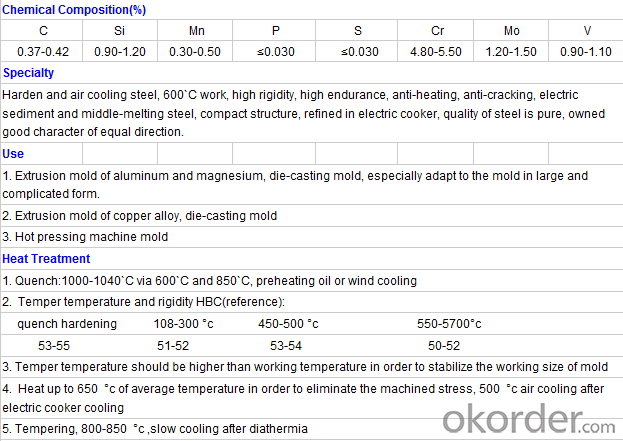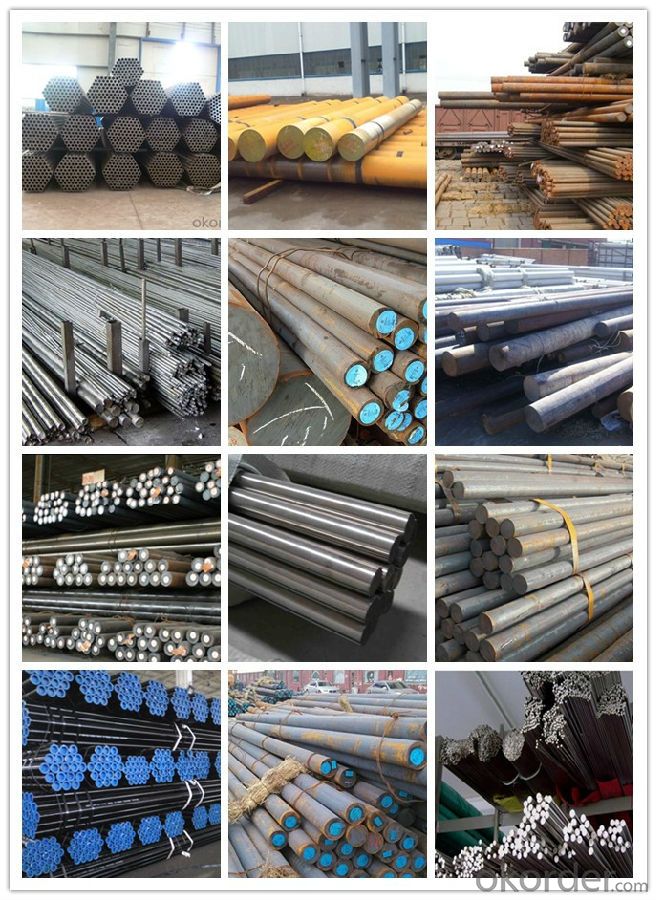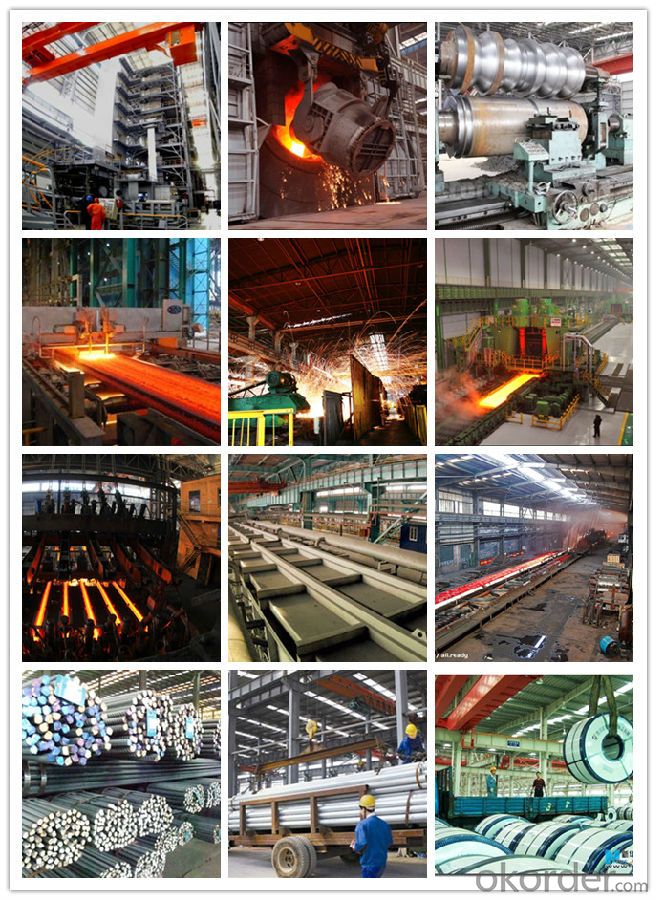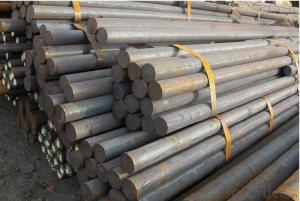Tool Steel H13/1.2344 Round Steel Bar Alloy Steel Bar
- Loading Port:
- China main port
- Payment Terms:
- TT OR LC
- Min Order Qty:
- 25 m.t.
- Supply Capability:
- 10000 m.t./month
OKorder Service Pledge
OKorder Financial Service
You Might Also Like
Item specifice
Tool Steel H13/1.2344 Round Steel Bar Alloy Steel Bar
Product information:
H13/1.2344 round bar
1.Diameter:10mm~600mm,
2.Delivery Conditon:annealed, black/turned surface
3.Short Delivery Time
4.Payment:By 30% ,T/T in advanced payment or L/C at sight
5.Min qty:25MT
6.Dlivery terms:CFR or CIF
7.Delivery time:according to your qty

Product show

Workshop show

Our service:
-High manufacturing accuracy
-High strength
-Small inertia resistance
-Strong heat dissipation ability
-Good visual effect
-Reasonable price
Chose happens because of quality, then price, We can give you both.Additionally, we can also offer professional products inquiry, products knowledge train(for agents), smooth goods delivery, exellent customer solution proposals.Our service formula: good quality+good price+good service=customer's trust
SGS test is available, customer inspection before shipping is welcome, third party inspection is no problem.
If you need the sample, please feel free to let me know. Any question, we will contact you ASAP!
- Q:Can special steel be used in the production of musical instruments?
- Yes, special steel can be used in the production of musical instruments. Special steel, also known as tool steel or high-performance steel, is a type of steel that has been specifically designed to possess certain properties that make it suitable for specific applications. These properties include high strength, durability, and resistance to wear and corrosion. In the case of musical instruments, special steel can be used in various components, such as strings, springs, keys, valves, and reeds. For example, piano strings are typically made from high-carbon steel, which provides the necessary strength and elasticity for producing the desired sound. Brass instruments like trumpets or saxophones have valves made from special steel alloys that have excellent corrosion resistance and can withstand the repetitive movements required for playing the instrument. In addition, special steel can also be used in the manufacturing of instrument parts like guitar frets. Frets are metal strips embedded along the fingerboard of a guitar, and they need to be made from a material that is durable, wear-resistant, and able to hold its shape over time. Special steel alloys, such as stainless steel or nickel-silver, are commonly used for this purpose. Overall, special steel offers a range of properties that can enhance the performance and longevity of musical instruments. By using this type of steel, manufacturers can create instruments that produce high-quality sound, are more resistant to wear and tear, and have a longer lifespan.
- Q:What are the different joining methods used for special steel?
- The different joining methods used for special steel include welding, soldering, brazing, and mechanical fastening. Welding involves melting the base metal and adding a filler material to create a strong bond. Soldering and brazing use lower temperatures to join the steel using a filler material with a lower melting point. Mechanical fastening methods include bolts, nuts, screws, and rivets, which provide a secure connection without altering the base metal's properties.
- Q:How does special steel contribute to reducing material waste?
- Special steel contributes to reducing material waste through its unique properties and manufacturing processes. Firstly, special steel is known for its high strength and durability, which allows for the creation of products that have a longer lifespan and require less frequent replacement. This reduces the amount of material waste generated from constantly discarding and replacing worn-out products. Moreover, special steel is often designed to be easily recyclable. Its composition and manufacturing techniques allow for efficient recycling, enabling the reuse of steel scrap and minimizing the need for new raw materials. This significantly reduces material waste by preventing the accumulation of discarded steel products in landfills. Additionally, special steel's versatility and customization options play a vital role in reducing material waste. By tailoring the steel's composition and properties to specific applications, manufacturers can optimize the use of materials and avoid unnecessary waste. Special steel's ability to be formed into complex shapes and sizes further enhances its efficiency, as it reduces the amount of excess material that would typically be wasted during the manufacturing process. In summary, special steel contributes to reducing material waste through its strength and durability, recyclability, and customization options. By promoting longer product lifespans, efficient recycling processes, and optimized material usage, special steel plays a crucial role in minimizing waste and promoting sustainability.
- Q:What are the specific requirements for special steel used in the electronics industry?
- In order to meet the unique demands of the electronics industry, special steel must fulfill certain requirements. These requirements include: 1. To protect electronic components from environmental factors like moisture, humidity, and chemical exposure, special steel used in the electronics industry must have high corrosion resistance. 2. Efficient transmission of electricity within electronic devices relies on the excellent electrical conductivity exhibited by the steel. This property is crucial for the proper functioning of electronic components. 3. Depending on the application, special steel used in the electronics industry must possess specific magnetic properties. Some electronics require non-magnetic steel to avoid interfering with sensitive magnetic components, while others may need specific magnetic properties for magnetic shielding or as core material in transformers. 4. To ensure the longevity and reliability of electronic components, the steel must possess high strength and durability, enabling it to withstand the stresses and strains encountered during the manufacturing process and throughout the lifespan of the electronic device. 5. Special steel used in the electronics industry must be able to withstand high temperatures without compromising its structural integrity or electrical properties. This is particularly important in electronic devices that generate heat, such as computer processors or industrial control systems. 6. The steel must be easily formable and machinable to enable efficient manufacturing processes and the production of intricate electronic components. This allows for the fabrication of complex shapes and designs required in the electronics industry. 7. To ensure optimal performance and reliability of electronic devices, special steel used in the electronics industry should have minimal impurities and contaminants. High purity steel guarantees the absence of unwanted elements that may cause electrical or chemical interference. Meeting these specific requirements for special steel used in the electronics industry is crucial for producing high-quality and reliable electronic devices. By fulfilling these requirements, the steel can withstand the challenges and environmental conditions unique to the electronics industry, ultimately contributing to the overall performance and functionality of electronic devices.
- Q:How is special steel used in the aerospace industry?
- Special steel is used in the aerospace industry for various applications due to its exceptional strength, durability, and resistance to extreme temperatures. It is commonly utilized in the manufacturing of aircraft structures, engine components, landing gear, and fasteners. The high strength-to-weight ratio of special steel enables the construction of lightweight yet robust parts, contributing to improved fuel efficiency and aircraft performance. Additionally, its ability to withstand harsh environmental conditions and maintain structural integrity makes it indispensable for ensuring the safety and reliability of aerospace systems.
- Q:What are the main characteristics of pressure vessel steel forgings?
- Pressure vessel steel forgings have several main characteristics that make them suitable for use in pressure vessels. Firstly, pressure vessel steel forgings are known for their high strength and toughness. This is crucial as pressure vessels are typically subject to high levels of internal pressure, and the steel must be able to withstand this without deforming or rupturing. The forgings are carefully designed and manufactured to ensure they have the necessary strength and toughness to withstand these pressures. Secondly, pressure vessel steel forgings have excellent resistance to corrosion. As pressure vessels often contain fluids or gases that can be corrosive, it is important that the steel used in their construction is resistant to corrosion. This helps to ensure the longevity and reliability of the pressure vessel. The steel forgings are often made with specific alloying elements that enhance their corrosion resistance. Another important characteristic of pressure vessel steel forgings is their ability to maintain their mechanical properties at high temperatures. Pressure vessels may be subjected to elevated temperatures due to the nature of the process or fluid they are containing. The forgings are designed to retain their strength and toughness even under these high-temperature conditions, ensuring the safety and reliability of the pressure vessel. Furthermore, pressure vessel steel forgings are typically manufactured with strict quality control measures in place. This is necessary to ensure that the forgings meet the required standards and specifications for pressure vessel applications. The manufacturing process includes thorough inspections, testing, and documentation to ensure that the forgings meet the necessary quality and safety requirements. Overall, the main characteristics of pressure vessel steel forgings include high strength and toughness, excellent corrosion resistance, the ability to withstand high temperatures, and strict quality control measures. These characteristics make pressure vessel steel forgings ideal for use in pressure vessels, providing the necessary strength, reliability, and safety required in such applications.
- Q:What are the different machining techniques used for special steel?
- Some of the different machining techniques used for special steel include turning, milling, drilling, grinding, and honing. These techniques are used to shape and finish the special steel according to specific requirements and tolerances. Each technique has its own advantages and is chosen based on factors such as the type of special steel, desired dimensions, surface finish, and the complexity of the part being machined.
- Q:What are the main advantages of using special steel in the medical field?
- The main advantages of using special steel in the medical field include its high strength and durability, excellent corrosion resistance, biocompatibility, and ease of sterilization. These properties make special steel ideal for manufacturing surgical instruments, implants, and medical devices that need to withstand rigorous use, maintain their shape and performance over time, and ensure patient safety and comfort.
- Q:What are the applications of special steel in the power generation supply chain?
- Special steel plays a crucial role in the power generation supply chain, specifically in applications where high strength, corrosion resistance, and temperature resistance are required. It is extensively used in the construction of power plant components such as boilers, turbines, and generators, as well as transmission lines and distribution systems. Special steel ensures the reliability and efficiency of power generation equipment, enabling it to withstand harsh operating conditions and maintain long-term performance.
- Q:How is boron steel used in automotive safety applications?
- Boron steel is used in automotive safety applications due to its high strength and ability to absorb and distribute impact energy. It is commonly used in the construction of safety cages, reinforcements, and components such as side impact beams, door beams, and crash boxes. Its exceptional crashworthiness properties help improve the structural integrity of vehicles, enhance occupant protection, and reduce the risk of serious injuries during accidents.
1. Manufacturer Overview |
|
|---|---|
| Location | |
| Year Established | |
| Annual Output Value | |
| Main Markets | |
| Company Certifications | |
2. Manufacturer Certificates |
|
|---|---|
| a) Certification Name | |
| Range | |
| Reference | |
| Validity Period | |
3. Manufacturer Capability |
|
|---|---|
| a)Trade Capacity | |
| Nearest Port | |
| Export Percentage | |
| No.of Employees in Trade Department | |
| Language Spoken: | |
| b)Factory Information | |
| Factory Size: | |
| No. of Production Lines | |
| Contract Manufacturing | |
| Product Price Range | |
Send your message to us
Tool Steel H13/1.2344 Round Steel Bar Alloy Steel Bar
- Loading Port:
- China main port
- Payment Terms:
- TT OR LC
- Min Order Qty:
- 25 m.t.
- Supply Capability:
- 10000 m.t./month
OKorder Service Pledge
OKorder Financial Service
Similar products
New products
Hot products
Related keywords





























